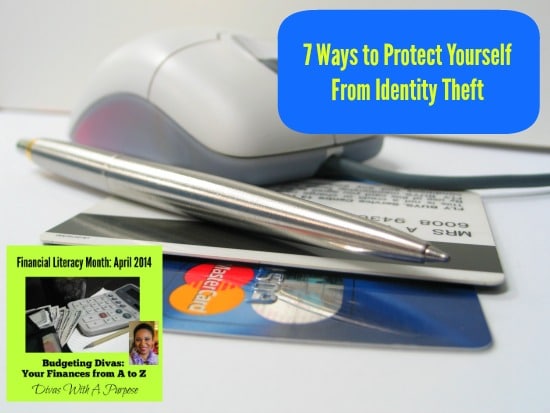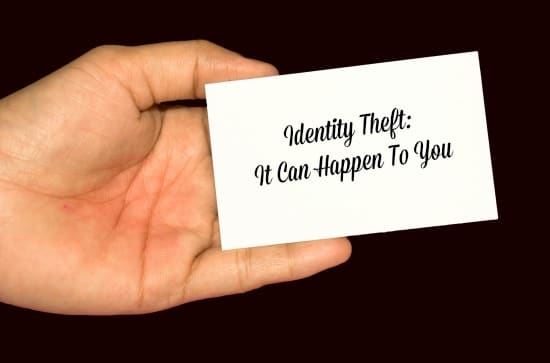Identity Theft: It Can Happen To You
 Today’s topic for Financial Literacy Month 2014: Your Finances from A to Z is Identity Theft – It Can Happen To You.
Today’s topic for Financial Literacy Month 2014: Your Finances from A to Z is Identity Theft – It Can Happen To You.
For the month of April, we will be bringing you daily posts centered on our personal finances – saving, making and managing our money.
The Federal Trade Commission estimates that as many as 9 million Americans have their identities stolen each year. In fact, you or someone you know may have experienced some form of identity theft.
The crime takes many forms. Identity thieves may rent an apartment, obtain a credit card, or establish a telephone account in your name. You may not find out about the theft until you review your credit report or a credit card statement and notice charges you didnt makeor until youre contacted by a debt collector.
Identity theft is serious. While some identity theft victims can resolve their problems quickly, others spend hundreds of dollars and many days repairing damage to their good name and credit record. Some consumers victimized by identity theft may lose out on job opportunities, or be denied loans for education, housing or cars because of negative information on their credit reports. In rare cases, they may even be arrested for crimes they did not commit.
How do thieves steal an identity?
Identity theft starts with the misuse of your personally identifying information such as your name and Social Security number, credit card numbers, or other financial account information. For identity thieves, this information is as good as gold.
Skilled identity thieves may use a variety of methods to get hold of your information, including:
1. Dumpster Diving. They rummage through trash looking for bills or other paper with your personal information on it.
2. Skimming. They steal credit/debit card numbers by using a special storage device when processing your card.
3. Phishing. They pretend to be financial institutions or companies and send spam or pop-up messages to get you to reveal your personal information.
4. Changing Your Address. They divert your billing statements to another location by completing a change of address form.
5. Old-Fashioned Stealing. They steal wallets and purses; mail, including bank and credit card statements; pre-approved credit offers; and new checks or tax information. They steal personnel records, or bribe employees who have access.
6. Pretexting. They use false pretenses to obtain your personal information from financial institutions, telephone companies, and other sources.
What do thieves do with a stolen identity?
Once they have your personal information, identity thieves use it in a variety of ways.
- Credit card fraud
- Phone or utilities fraud
- Bank/finance fraud
- Government documents fraud
- Other fraud
– They may get a job using your Social Security number.
– They may rent a house or get medical services using your name.
– They may give your personal information to police during an arrest. If they don’t show up for their court date, a warrant for arrest is issued in your name.
How can you find out if your identity was stolen?
The best way to find out is to monitor your accounts and bank statements each month, and check your credit report on a regular basis. If you check your credit report regularly, you may be able to limit the damage caused by identity theft. For more information, visit the Detect Identity Theft section.
Unfortunately, many consumers learn that their identity has been stolen after some damage has been done.
You may find out when bill collection agencies contact you for overdue debts you never incurred.
You may find out when you apply for a mortgage or car loan and learn that problems with your credit history are holding up the loan.
You may find out when you get something in the mail about an apartment you never rented, a house you never bought, or a job you never held.
Seven Tips For Avoiding Identity Theft

1. Keep Important Documents Safe and Secure. Never allow anybody to fix your wallet, purse, or bag where you have IDs, bank statements, credit cards, and other important documents to prevent identity theft. You shouldnt be complacent, even with those close to you. Studies show that in around 26% of identity theft cases, victims knew the perpetrators.
2. Properly Dispose Important Documents. Shred or tear up receipts, personal applications, bank or credit card statements and scatter them among different waste bins to prevent identity theft. Better yet, burn them before throwing them away. Do not leave transaction receipts behind after making a purchase to prevent identity theft. Never leave your receipt at the ATM machine.
3. Do Not Giving Out Personal Info Over the Phone. Never give your account details and other similar information to someone who calls you asking for it. To prevent identity theft, ask to ring them back, or bother to see them personally at their office before giving out any details. Better yet, to prevent identity theft, give out details only if you initiated contact.
4. Bringing Only IDs You Need. Its easier to keep track of your IDs on a daily basis if your wallet only has current ones or those that you actually use for transactions during the week. To prevent identity theft, leave IDs you dont particularly need at home, locked up in a safe place.
5. Fill Out Only the Last Four Digits at the Bank. Did you know that writing only the last four digits of your bank account number when filling up deposit or withdrawal forms will suffice? The teller can take care of the rest. Also, to prevent identity theft, tear up any transaction slips you want to discard, and toss them in the bin. Do not leave them on the counter.
6. Be Constantly Aware of Your Surroundings. During a purchase, make sure your credit or debit card is handed right back to you after a transaction. Cup your free hand over the hand that is punching in your PIN, especially at an ATM machine.
7. Stay Informed! Take time to research the latest modus operandi of identity thieves. You should be especially concerned if you use the Internet to make financial transactions. To prevent identity theft, you will have to be on your guard against web spoofing (using a replica of a trusted site to manipulate your transaction) and bogus e-mail.
Taking these simple steps can do to help protect yourself identity theft. In this age of advanced communications and technology and with the thieves getting more deceptive than ever, it is imperative to continue to educate yourself. Be cautious and understand that this information can be abused and it is up to you to safeguard yourself and your family.

